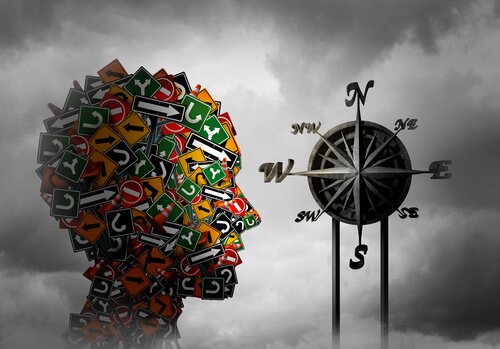Is Psychology a Science?

Many people question if psychology is a science. They say that it’s too subjective. Similarly, they say things like “I have a knack for psychology. I can look at any person and tell what they’re like”. Affirmations like these show us how confused people are regarding this discipline. In fact, most of the population doesn’t know what it means to study psychology.
To be able to conclude if psychology is a science or not, we must first understand what a science is. Many people believe that science is the undisputed bearer of truth since it observes reality and describes it. However, that definition is incorrect.
What is a science?
A science is a branch of knowledge that seeks to describe, explain, predict, and modify some domain of reality. In the case of psychology, it deals with human behavior and cognitive processes. Science has a practical objective. It tries to understand certain events to be able to use them in our favor. For this purpose, it has its own methodology called the scientific method.

The scientific method is a hypothetico-deductive strategy used to draw conclusions. It consists of a series of steps:
Problem statement
It’s the first step of the scientific method. It consists of searching for a problem whose cause or reason is still unknown. An example of this may be to ask why do all things fall towards the ground or how do humans learn.
Hypothesis
Through observation, deduction, and bibliographic review, we can develop a series of hypotheses. This consists of theorizing how the problem arises. Hypotheses aren’t true or false. They’re possibilities waiting to be tested.
Testing
Once we have the hypotheses, the next step is to test them to prove them. An experiment must be designed to verify the hypotheses. This experiment can be carried out in many ways. For example, through surveys, direct observation, and experimental manipulation.
Data analysis
After the experiment, we proceed to the statistical analysis of the data. If this data proves that the hypotheses are wrong, we discard them. But if we haven’t been able to disprove them, they’re considered proven.
However, it’s important to understand that we can never fully prove a hypothesis because we don’t have access to all the data. The term ‘proven’ only indicates that we haven’t been able to disprove it yet.
Communication of the results
It’s the most important part of the scientific method. It wouldn’t make sense to discover something and not share it. By communicating the results, we make people more knowledgeable. Additionally, it allows us to solve new problems. Furthermore, sharing the results of an experiment allows other researchers to replicate it and discover more evidence.
The key aspect of this process is understanding that science attacks its own hypotheses to reduce errors and avoid affirming dogmas. Science is in constant verification since it always leaves room to doubt the tested hypotheses. Thus, it’s a dynamic method that adapts to new data that arises.
Another important issue is the distinction that some people make between ‘hard sciences’ and ‘soft sciences’. Biology, physics, and chemistry fall under ‘hard sciences’, which are sciences that seem more objective and easily observable. However, it’s a mistake to think so. For example, just like we infer through observable events that gravity exists in physics, we do the same with anxiety, emotions, or learning processes in psychology.
At any rate, science isn’t concluding what happens, but why it happens. And to do so, ‘soft sciences’ and ‘hard sciences’ use the same method.
Intuitive psychology
All of us form intuitive theories of how the world works. This helps us maintain control and predict what’s going to happen. Therefore, we have an intuitive psychology that tells us how we believe others behave and why they do so. However, it’s a serious mistake to think that these beliefs are correct.
Intuitive psychology is based on mental shortcuts formed by previous experiences. Depending on our education, experiences, and personal history, we’ll have certain ways of perceiving what happens around us. These judgments are totally subjective. Therefore, they’re a part of our life but have nothing to do with the scientific discipline of psychology.
Scientific psychology
Scientific psychology is the total opposite of intuitive psychology. Specifically, it doesn’t rely on beliefs or judgments to explain human behavior. Instead, it uses the scientific method and experimentation to collect objective data and interpret it. Psychological concepts are born as a result of the investigations carried out.

Knowing the difference between opinion and interpretation will help us understand that psychology is a science. Opinions are beliefs we have due to our experiences. For example, we can say that human beings are good and that society corrupts them because our experiences are consistent with this idea.
On the contrary, interpretation consists of analyzing, deciphering, and explaining an event through scientifically obtained data. Let’s continue with the previous example. If data can’t prove that human beings are good or bad, we’ll have to interpret it from a different perspective that integrates all the available information.
Scientific psychology isn’t a matter of opinions. We can’t discuss it in the same terms as intuitive psychology. The first is based on the interpretation of the evidence obtained. Therefore, it’s all about giving meaning to available information. The only way to refute the results of a scientific investigation in psychology is with objective data that disproves it.
Why do some people believe that psychology isn’t a science?
We’ve seen that psychology uses the same methods and that it has the same validity and reliability as other sciences. But why do so many people doubt whether it’s a science or not? Next, we’ll examine three of the main reasons why this happens.
First of all, the concept of science still confuses a lot of people. Most of the population has a very poor definition in mind. This, along with people’s ignorance regarding the instruments used to measure behavior and mental processes, lead people to classify psychology as subjective and unscientific.
The second reason is the pseudoscientific practices that derive from psychology. Unfortunately, many people use the term ‘psychology’ to refer to practices that don’t use the scientific method. Consequently, a large part of the population wrongly relates pseudoscience to psychology. However, in reality, they have nothing to do with each other.

Finally, psychology studies human beings. In physics, chemistry, or other sciences, the results barely ‘involve’ people and they’re accepted without any resistance. However, studying human beings is different. If the results go against our intuitive beliefs, we quickly try to solve this cognitive conflict. It’s easier to ignore the evidence presented than to restructure our beliefs about it.
Conclusion
If someone asks you if psychology is a science, the answer is a resounding YES. It’s a very important discipline that allows us to understand ourselves both individually and as a group.
This text is provided for informational purposes only and does not replace consultation with a professional. If in doubt, consult your specialist.








